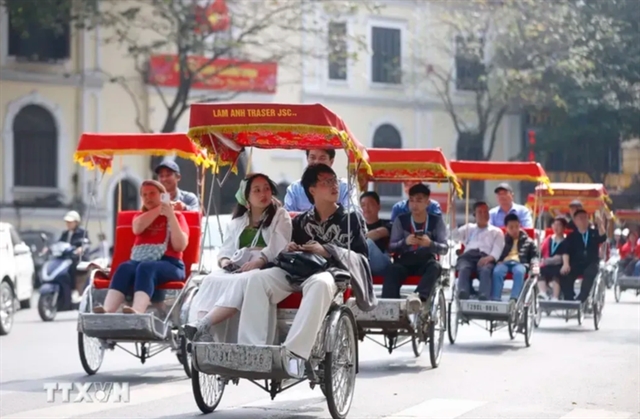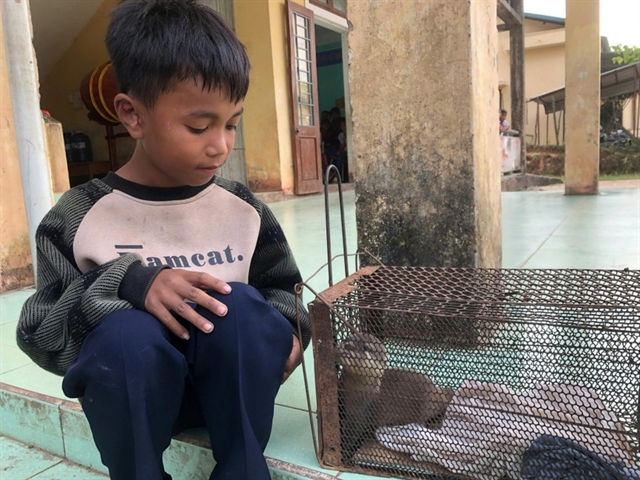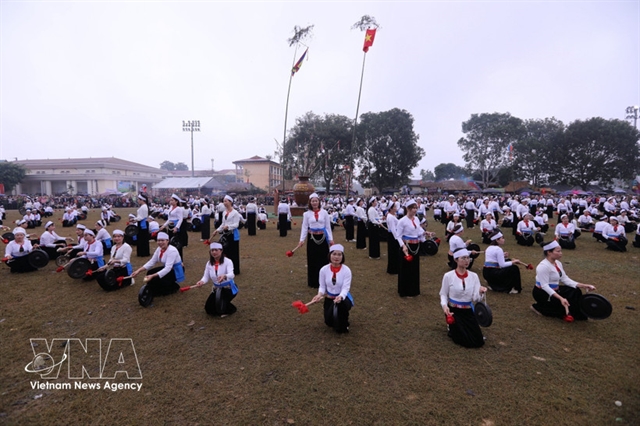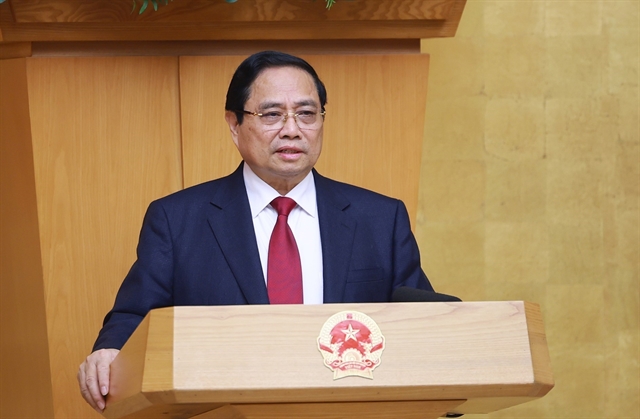 Politics & Law
Politics & Law
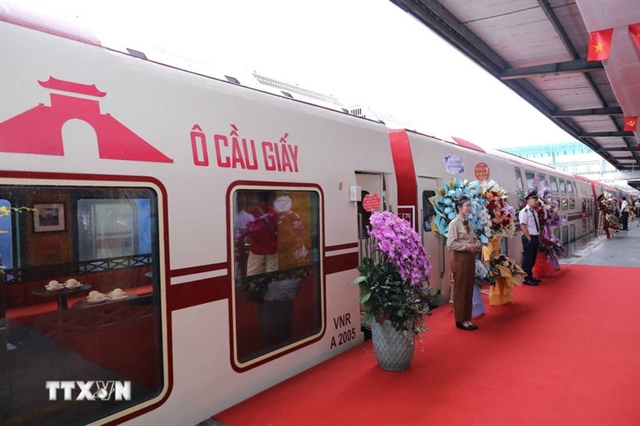
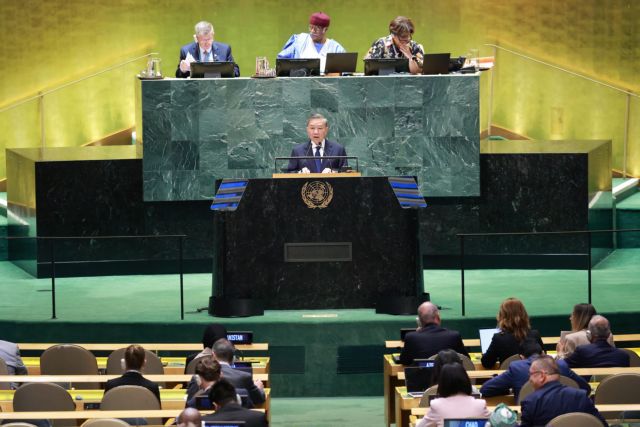 |
| Party General Secretary Tô Lâm delivers a speech at the Summit of the Future at the 79th session of the UN General Assembly (UNGA 79) in September last year. VNA/VNS Photo |
HÀ NỘI – Party General Secretary Tô Lâm has emphasised that economic integration must remain the core focus, with integration in other sectors serving to support and facilitate this objective. The top priorities, he noted, are economic restructuring, renewal of the growth model, and the advancement of digital transformation.
These points were made in his written article titled Rising in International Integration.
He underscored the need to prioritise sectors with clear advantages and potential, directing resources towards key industries and strategic projects—particularly in infrastructure and energy. These include high-speed railways, expressways, seaports, airports, as well as nuclear, wind, and solar power plants, and other initiatives that reduce emissions and aim for carbon neutrality. Efficiency and the avoidance of waste are essential, especially in the context of digital transformation and the ongoing Fourth Industrial Revolution.
He stressed the importance of maximising the benefits of international economic commitments, agreements, and partnerships—especially new-generation Free Trade Agreements (FTAs)—to ensure mutual benefit and reduce reliance on specific partners.
To this end, domestic institutions must be strengthened to enhance the capacity for implementing international commitments and agreements. Special mechanisms and policies should also be developed to attract high-quality foreign direct investment (FDI), with a focus on key emerging industries that serve as new engines for productivity growth, such as information technology, telecommunications, semiconductors, and artificial intelligence.
He further called for appropriate policies to encourage foreign investors to transfer technology, management expertise, and professional skills to Vietnamese enterprises and workers. At the same time, Vietnamese businesses should be supported in investing abroad, operating effectively, and building globally recognised national brands.
“Our country is entering a new era of national rise—towards prosperity and strength—in pursuit of a 'wealthy people, strong nation, democratic, equitable, and civilised society.' This requires a renewed mindset, elevated position, and a fresh approach to international integration,” he wrote.
He described the Politburo’s introduction of Resolution No. 59-NQ/TW on January 24, 2025, regarding international integration in the new context, as a “breakthrough decision” and a historic milestone. It positions international integration as a driving force for national development in a new era—shifting from passive reception to active contribution, from deep and broad participation to full integration, and from the stance of a latecomer to that of a rising nation pioneering in emerging fields.
He affirmed that the Party has consistently regarded international integration as a vital strategy to enhance Việt Nam’s political stature, boost economic growth, safeguard national security, and elevate the country’s global standing. Over time, this process has evolved—from selective and ideologically cautious engagement to initial economic openness, and now to broad, comprehensive integration.
He stated that, alongside national defence and security, "promoting external affairs and international integration" is a vital and ongoing task. The guiding principle in international integration, he noted, is to "optimise external resources and favourable conditions for the goal of protecting the homeland and developing the country early and from afar, while ensuring the highest interests of the nation and the best interests of the people."
He emphasised that international integration must be a collective effort of the entire population and the whole political system, under the leadership of the Party and the management of the State. "The people and businesses are the centre, subjects, driving forces, main forces, and beneficiaries of international integration," he said. He stressed that integration must go hand in hand with the preservation of national identity, not its erosion.
He underscored that international integration must be grounded in intrinsic strength, which plays a decisive role.
"Enhancing internal strength must go hand in hand with making effective use of external resources. Internal strength is the main source and root of power, and must always be promoted to ensure proactivity, independence, and resilience. At the same time, it is essential to make full use of external resources to complement and reinforce internal capabilities. A harmonious combination of national strength and the strength of the era will form the foundation of Việt Nam’s power in this period of national ascent," he noted.
He described international integration as a process of both cooperation and contest, where one must "cooperate to struggle and struggle to cooperate." He emphasised the need to prioritise partnership over confrontation, while upholding the core principles of the United Nations Charter and international law. Throughout the integration process, he said, Việt Nam must demonstrate the spirit of being "an active and responsible partner" of the international community, always ready to contribute to regional and global efforts.
International integration, he stressed, must be "concerted, comprehensive, intensive, and extensive," with various sectors closely linked and reinforcing one another within a coherent overall strategy, guided by clear focus, appropriate roadmaps, and step-by-step implementation.
He called for a shift in mindset, awareness, and action in approaching international integration. Political, security, and defence integration, he said, must aim to enhance the nation’s capacity and position, and to "protect the country early and from afar, before danger arises."
He also stressed that integration must make effective use of established partnerships to foster political trust, mobilise resources for development, resolve outstanding issues through peaceful means, and strengthen cooperation rooted in respect for and adherence to international law. He called for strengthened coordination with partners to effectively address both traditional and non-traditional security challenges, including the East Sea issue, water and food security, environmental pollution, epidemics, cybercrime, and transnational crime.
"With our new position and strength, we are able to assume a core, leading, and mediating role in appropriate areas; contribute more actively to international peacekeeping and search and rescue missions; diversify defence and security cooperation; and develop a self-reliant, modern, and dual-use defence and security industry," he said.
Science, technology, and innovation must be identified as top important breakthroughs, drivers for the rapid development of productive forces, thus improving production relations in line with Resolution 57. Therefore, international integration in these fields must align domestic standards and regulations on science and technology with advanced international norms and practices, he said.
He urged the promotion of comprehensive integration in culture, society, tourism, the environment, education and training, health care, and other sectors.
It is important to address bottlenecks in implementing international commitments and agreements, and accelerate the finalisation of institutions and policies, focusing on efforts to review and incorporate international laws into domestic laws to fully, consistently, and effectively implement our obligations and commitments. Organisations and associations must enhance supervision to implement policies, laws and international integration commitments.
Ministries, sectors, and localities must speed up the enforcement of international agreements and commitments. At the same time, it is essential to institutionalise and specify international integration strategies by sector, especially in areas such as green economy, digital economy, circular economy, energy transition, digital transformation, carbon emission reduction and outer space.
He called for promoting the spirit of Resolution 18 in international integration, the focus should be on streamlining specialised agencies towards a lean, efficient, modern, and professional direction. The goal is to make these mechanisms operate more effectively, creating positive changes in coordinating international integration efforts across all levels, sectors, localities and among people and businesses.
The personnel work must be viewed as fundamental, focusing on building a team of professionals in international integration that possesses high expertise and skills at the international level, and capable of participating in mediation and resolving international disputes. Innovation should be encouraged to improve the proactivity and creativity of localities, people, and businesses in international integration.
"International integration will only succeed when it becomes a conscious culture embraced by all organisations, individuals, businesses, and localities; and when it harnesses the central role and the active, proactive, and creative participation of the people, enterprises, and localities. This includes linking international integration with domestic integration, connecting regions, localities, sectors, and fields, as well as bridging research with implementation, to deliver tangible results from the integration process," he stated.
He noted that the nation stands at a pivotal moment, facing both a great opportunity to rise and immense challenges. The achievements of international integration thus far have helped build the strength and momentum necessary for further breakthroughs.
Building on this foundation, he affirmed that Resolution 59 represents a major shift in the Party’s thinking and strategic orientation for international integration in the coming period. It aims to generate fresh impetus to propel the country towards a glorious era of "independence, freedom, happiness, prosperity, and lasting success," he concluded. — VNS

